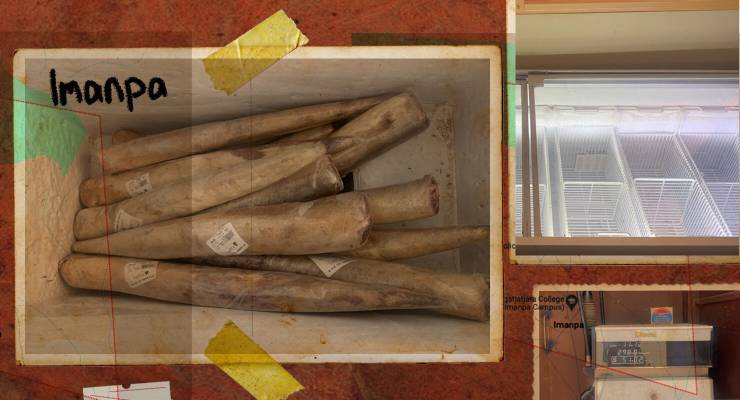
This is part four in a series. Read the full series here.
The bottled water fridge is empty, the freezer is void and there is limited stock lining the shelves. Outback Stores Imanpa store manager John Prunty explains that it’s day 13 of a 14-day delivery cycle and Sorry Business has exacerbated dwindling supplies: “A funeral wiped us out. We’re running on empty at the moment.”
When there’s no food in-store, Imanpa community members travel 50 minutes (73km) by car to Erldunda, two hours (186km) up the highway to Yulara, or three hours (273km) to Mparntwe (Alice Springs). You can’t buy petrol in community, and where residents can fill up, the Alice Springs return trip generally costs them about $200.
“I should be buying an extra $200 of food here,” Imanpa woman Anne Luckey tells Crikey and reporting partner Indigenous Community Television (ICTV). She makes the commute into town every 14 days. “At least we’ve got a store and it’s open. Kardiya [whitefella] is helping but they need to stock up. Smokes run out, drinks run out, bread, butter, it all runs out.”
The small Northern Territory Indigenous community of Imanpa is 6km off the main Lasseter Highway. It’s home to a population of about 130 Indigenous people and has a single general store — a one-stop shop for food, goods and supplies that maintains complete control over the availability, affordability and quality of food in community.
The message from Michael Borg, CEO of Outback Stores (the Commonwealth company that manages remote general stores nationwide) was that fresh produce was plenty, food deliveries were regular (notwithstanding environmental hold-ups), and prices were competitive with big supermarket retailers. But a four-day Crikey/ICTV on-the-road-reporting trip through six NT and South Australian remote Indigenous communities and an equal number of general stores (both Outback Stores and Aboriginal-owned and controlled Mai Wiru) found stock was low, prices high, healthy options scarce and unhealthy food and habits marked up.
In Imanpa, a packet of 20 cigarettes costs $61. Luckey says she has paid $98 for a pack of 25, and when the store runs out she’d rather spend the money on petrol to get to Erldunda than go without: “It’s the same amount of money to get the car to Erldunda as it is to buy smokes. And you need a jerry can to get from here to there because we got no petrol, only diesel. No-one has diesel cars.”
The cost of a 20-litre jerry can is $71 in Imanpa. In other communities, they are as much as $100. These go for $21 at Bunnings.
White goods costs are also exorbitant — we found a washing machine that was $1,334 and a second-hand clothes dryer for $763 — and staple Indigenous food items such as kangaroo tail are sold by weight for as much as $27. In town at IGA, these are priced between $12 and $13, but Luckey’s sister Kathleen says that not long ago you could buy them for $5.
Cross-border problem
More than 1,000kms from Imanpa across the Western Australia border lies the remote Indigenous community of Wirrimanu (Balgo). Last month, Outback Stores took over management of the general store (for a second time) in a bid to quell the community’s dire levels of food insecurity and its acute cost-of-living crisis. Its first round of management terminated abruptly in 2019 when Outback Stores was evicted from Balgo by community members over alleged financial misconduct and breaches of contract. Community art centre manager and long-term resident Poppy Lever says the locks were “changed overnight”. The case went to court, Outback Stores denied all wrongdoing, and it was eventually settled in September 2020.
Although the community-led overhaul paved the way for an era of local ownership, this came directly before the biggest wet season in years (cutting off road access into community) and the COVID-19 pandemic, which further sliced supply chains and affected food on shelves. For three years, Lever says food and management were “completely irregular” and Balgo cycled through about 30 store managers.
In short: the community descended into chaos courtesy of a dysfunctional general store and dire food insecurity. Tensions flared, break-ins were rife (“People would literally just walk in and go shopping at night. Take all the tobacco, take all the cash, take all the TVs, night after night,” Lever says), prices were “jacked-up” to match, and the business became increasingly untenable.
“They even had signs up saying, ‘Because there’s so much stealing going on, we’re going to have to put up prices,’ ” Lever says. “People that are already financially poorer, all of a sudden have to pay more not only for remote allowances, but theft allowances, which then causes more theft and more disadvantage because people can’t afford the food.”
The hope is Outback Stores 2.0 will play a stabilising role in Balgo, but Lever says it’s no easy feat to reinstate four years of damaged social cohesion, eroded trust and entrenched feelings of complete and utter powerlessness: “I’ve been in Balgo five and half years and I’ve never seen the community so apathetic.”
She says the chop and change of “whitefella ways” has had a whiplash effect on Indigenous communities. Be it a change of mind or change of rules, the constant overhaul of systems and governance every few years is at odds with the tens of thousands of years of continuous relationships and rules Indigenous people have abided by.
“For Blackfellas, shit didn’t change, it was banked on. It was a known. It was a guarantee,” Lever says, adding that this is why stand-alone monetary policies punishing unhealthy eating and habits only deepen disadvantage.
“What people still live on is ration food. It is sugar, tobacco and flour. This is what people in community were given for 50 years by the whitefella and all of a sudden they’re being told they shouldn’t have it … If people are really, really hungry and there’s no food, you know what quenches food craving? Chewing tobacco and smoking.”
In Balgo, the cost of tobacco was $105.
Keeping tabs on remote general stores
Since 1999, there have been many iterations of federal, state and territory inquiries into the availability, nutritional value, pricing and security of food in remote Indigenous communities. These reports and subsequent recommendations have consistently looked into the role and set-up of the companies that manage the provision and price settings of food, with recommendations focused on environmental and “remote” roadblocks, regulation, licensing agreements, top-down vs bottom-up governance structures and overwhelmingly how to improve health outcomes for Indigenous people by promoting healthy foods.
The latest inquiry was commissioned in 2020 by former minister for Indigenous Australians Ken Wyatt. The government response came in 2021 — of the 16 recommendations to bolster infrastructure, training, communications, food and nutrition standards, and price monitoring mechanisms, only two were supported, eight were supported “in principle”, five were noted, and one was not supported. The two recommendations the government signed off on were a commitment to “encourage” wholesalers to set up more local distribution centres in major regional centres, and for the National Indigenous Australians Agency (NIAA) to “consult” with stakeholders to streamline deliveries.
Ngaanyatjarra Pitjantjatjara Yankunytjatjara (NPY) Women’s Council CEO Liza Balmer — involved in monitoring food availability, price and nutrition in community stores — is clear: “Food security’s a bit of a topic at the moment, but there’s a real risk that remote communities get swept up in the national conversation and don’t get what they need.
“It’s not just about money, which is what it is for people in the cities. In remote communities, there’s only one place to buy food. If there’s bad weather and the truck can’t get in, there’s no food in the store. That’s real food insecurity.”
She tells Crikey and ICTV that general store models need to start being classed as essential services, not profitable businesses that serve as the only source of income for a particular community. She says that would open stores up to subsidies — “not necessarily direct food subsidies”, but funding for store managers or infrastructure to support food delivery, such as road maintenance, freight services and mechanical maintenance. All these supply chain improvements would help reduce the cost of food.
Short of the work done by NPY Women’s Council, there’s little monitoring of remote in-store price settings. Borg says Outback Stores products are calculated by “landed cost price”, freight and necessary store margin. He says the company doesn’t have its own transport fleet so delivery costs (distance travelled and frequency of dispatch — either weekly or fortnightly) also affect shelf price. Apart from a line of staples, this means the cost of goods is not consistent across stores.
For Mai Wiru stores, prices were uniform company-wide, with each store absorbing the freight costs of all stores. CEO Dennis Bate says it costs “tens of thousands of dollars” a week to transport goods and that “obviously” has to be covered by in-store pricing. According to Mai Wiru’s 2022 financial report, the company spent $1.82 million on freight in the year to June 2022.
Neither company adjusts prices to align with Australia’s consumer price index (CPI).
In terms of nutritional value, Bate says certain Mai Wiru foods are subsidised — baby foods and products, lean meat, mince, chops and sausages — and it, in return, receives $25,000 in rebates from store partner Coca-Cola Amatil.
Borg (a former NT regional manager for Coca-Cola Amatil) says Outback Stores’ fresh fruit and vegetables are priced “as close as possible to major metropolitan retailers, or sometimes lower” and many stores have “sugar-free” days in place (in Imanpa, for example, soft drink is not sold on Tuesdays). But what Crikey and ICTV learnt is that fruit and veg is not generally what people in community purchase.
Disconnects with remote Indigenous communities
Balmer tells Crikey and ICTV that although a healthy basket of food is far cheaper than an unhealthy basket of food, most people in community opt for the latter due to nutritional knowledge deficits (through no fault of their own) and the inability to store and prepare food at home — fresh foods require a fridge, freezer, power and gas to keep and cook.
“They’re often going for either pre-prepared things which are more expensive or takeaway,” Balmer says, adding that takeout menus are entirely contingent on store managers who are neither nutrition-trained nor employed to offer an educational service day-in-day-out on good eating.
The result is that although prices on certain goods have gone down, community does not reap the rewards because the products they eat — meat in particular — are up.
Across all the stores — both Outback Stores and Mai Wiru — there’s a big disconnect between pricing, diets and what constitutes appropriate stock. In Imanpa, Luckey’s sister Kathleen says community had recently asked for tents and tarps for Sorry Business but Prunty wasn’t able to assist because the “big boss said no”: “We will have Sorry Business again. Visitors come and people move out. We need these things.”
Community is meant to have a say in Outback Stores store operations, and while Kathleen says Imanpa’s local board of directors has good communications with Prunty — “John is a kind-hearted person and he tries to help. It’s not his fault” — a lot of information and store-related decision-making never reaches community.









Crikey is committed to hosting lively discussions. Help us keep the conversation useful, interesting and welcoming. We aim to publish comments quickly in the interest of promoting robust conversation, but we’re a small team and we deploy filters to protect against legal risk. Occasionally your comment may be held up while we review, but we’re working as fast as we can to keep the conversation rolling.
The Crikey comment section is members-only content. Please subscribe to leave a comment.
The Crikey comment section is members-only content. Please login to leave a comment.